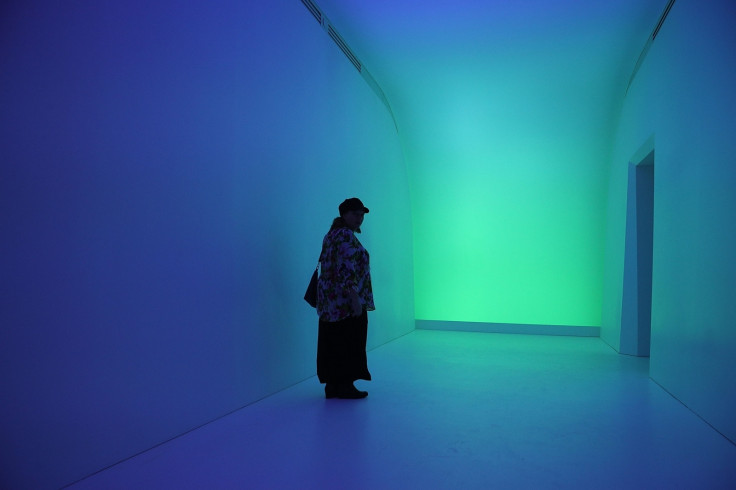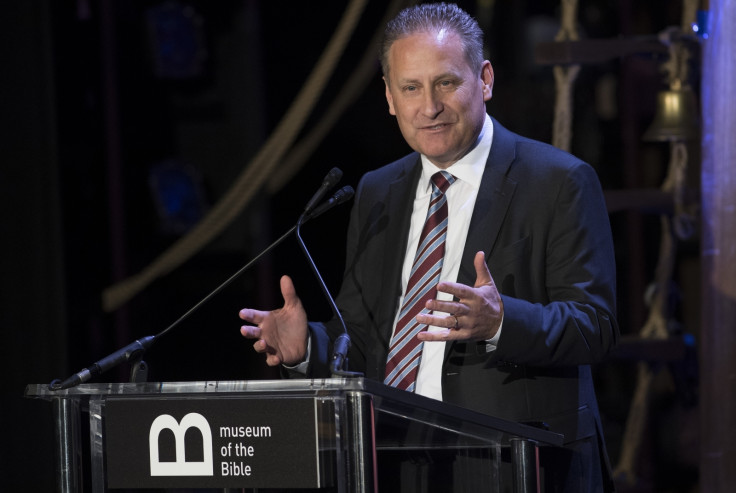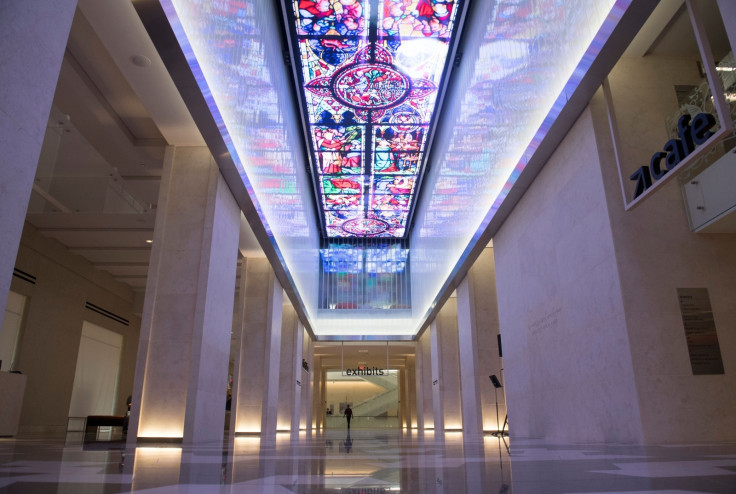Museum of the Bible: Washington DC's controversial new Evangelical monument
Opened in November, the museum is dividing opinions in the American capital.
A few streets south of Washington DC's famous mall, a strip that features several of America's most iconic monuments, two imposing bronze slabs have been erected to welcome the city's newest and arguably most controversial institution: the Museum of the Bible.
As the name implies, the Museum of the Bible aims to tell the historical and cultural story of the holy book. From the region that founded the Abrahamic faiths, to the book's role in American history, to the works of art that have been influenced by the Bible, the museum contains striking pieces and exhibits, as well as notable omissions, that will keep the building's controversial reputation safely intact.
The museum was founded by the family behind Hobby Lobby, a name that surrounds religious conversations thanks to a Supreme Court case the company brought against former President Barack Obama's Affordable Care Act. On religious grounds, Hobby Lobby, owned by an Evangelical Christian family, did not think it should have to cover contraception on its employee health care plan - and won.
For those already sceptical of a museum for the bible, learning that the new non-profit was founded by Hobby Lobby president, Steve Green, is unlikely to assuage worries.
Adding to that, the earliest tax filings for the non-profit had the ambitions of the building written out plainly. The "primary exempt purpose" of the museum was "to bring to life the living word of God, to tell its compelling story of preservation, and to inspire confidence in the absolute authority and reliability of the Bible".
That was 2011, in 2012 it said the same thing. In 2013, it changed track. "Museum of the Bible exists to invite people to engage with the Bible through our four primary activities; travelling exhibits, scholarship, building of a permanent museum in Washington DC, and developing an elective high school curriculum."
By 2016, it said it was inviting people to engage with "the history, narrative and impact of the Bible".
The museum's chair, and Hobby Lobby CEO, Steve Green told the Chicago Times that the museum was limited: "It doesn't overtly say the Bible is good - that the Bible is true," Green told the paper. "Its role is to present facts and let people make their own decisions."

Professor of Semitic Languages at George Washington University in Washington DC, and a member of the Society of Biblical Literature's executive council, Christopher Rollston told IBTimes UK that while it was fair that some his colleagues focused on the "sins of the past... it's not fair if one is going to critique them for past practices and not note that the practices have changed now".
Those sins, partly detailed above, have given way to an institution attempting to take on its subject in a historical and subjective manner, Rollston says, but there's room for improvement. Hagar could have been featured more, in Rollston's eyes, not only a female character in the biblical stories but as a figure who holds relative importance in all three Abrahamic faiths.
His other suggestion has now seemingly been rectified, the museum's section dedicated to the Bible in American history and a part explicitly discussing the faith of the country's founding fathers, has a facsimilie of the Jefferson Bible. "[Thomas] Jefferson in essence cut and pasted from the new testament gospels the things that he thought were historical," Rollston explains.
The country's third president and first secretary of state did not believe in miracles, he did not believe in the virgin birth and he did not believe in the ressurection of Christ - elements that could be considered central to Jesus's godliness in Christian eyes.

"I do think for the sake of balance and especially because many americans don't know Jefferson's view - and many americans do refer to the faith of the founding fathers - it would be pretty useful to have on display there a Bible that reveals the faith of one of the founding fathers." Rollston had previously told us. The Museum of the Bible informed IBTimes UK that there is a version now on display.
Rollston had said that he had brought this up with the museum "in pretty strong terms" but at the time suggested that the edition did not appear to be on their radar. As for other biblical scholars, the Society of Biblical Literature (SBL) recently finished their annual meeting, attended by over 4,000, and the museum was certainly a topic of conversation.
In diplomatic terms, Rollston said that "strong feelings" were conveyed on both sides. In October, SBL issued a statement, again spoken diplomatically, saying they encouraged the museum to be as non-sectarian as possible and emphasising that the museum's large collection meant it bore "a great responsibility to the scholarly community".
As Rollston made clear, he alongside other scholars had spoken with authorities at the museum, but there are as yet no formal lines of dialogue. The scholarly potential of the collection is undeniable, a large floor features over 800 pieces on loan from the Israeli antiquities authority; as Rollston put it, the floor is "the real McCoy".

But acquisition of parts of the museum are a similar area of worry for experts in the field. In July 2017, US Immigration and Customs Enforcement announced it had reached a settlement over hundreds of ancient clay tablets originating from Iraq which had been purchased and shipped to Oklahoma under false labels by Hobby Lobby against the advice of its cultural property law expert.
The settlement saw Hobby Lobby forfeit the tablets and fined $3m. With the family links to Hobby Lobby, the museum released a statement saying it was "not a party to either the investigation or the settlement" and that none of the artefacts identified in the settlement was part of the Museum's collection, nor have they ever been". The museum, it says, adheres to standards set by the Association of Art Museum Directors and the American Alliance of Museums.
In September, the museum then put out a press release saying it had "engaged Thomas R. Kline, an attorney with Cultural Heritage Partners, to advise the board on matters of cultural property, governance and museum operations", noting that Kline was "a nationally recognised authority on cultural heritage preservation".
Though IBTimes UK contacted the museum prior to its opening on 17 November to enquire about touring the facility there was not a reply. We did attend the museum on Thursday 30 November.
Controversy around the museum is understandable in a country that mandates a separation of church and state in the constitution but finds itself culturally steeped in religious references and iconography. The Museum of the Bible notes in numerous places that it is just "three blocks from the U.S. Capitol".

When IBTimes UK enquired about the results of a survey of biblical attitudes inside an exhibit on the Bible in America, a representative said they did not have the information to hand but would be back in touch - it might provide a hint at the audience gathering at the museum.
For Rollston, the question makes sense but he notes "the bible has been part of American culture even before there was a United States". He has a different suggestion to assuage sectarian worries: "I firmly believe there should be a museum of the Qu'ran in D.C. as well," he says. "I think that that sort of thing is important to create a broad, diverse dialogue across the Abrahamic religious traditions." Now there is a Museum of the Bible, Rollston argues, a Museum of the Qu'ran would be, in his words, "entirely fitting".






















